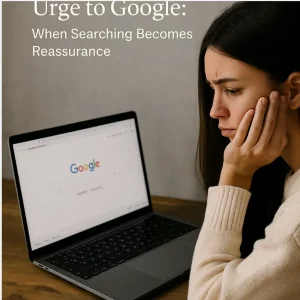
Most of us turn to Google when we want quick answers. A sore throat, a strange sensation, or a burst of worry can send us straight to the search bar. For people living with anxiety, this urge to “Google it” can become a daily cycle. While it feels like a way of finding certainty, it often fuels more fear in the long run.Health anxiety, OCD, and generalised anxiety disorder often involve a powerful need for reassurance. Searching online provides a fast hit of temporary relief: “If I can just find the right answer, I’ll feel better.” But that relief rarely lasts. Instead, one search leads to another, and the more you read, the more frightening possibilities you encounter. Google cannot tell you whether you are truly safe, it can only offer endless scenarios.
Why Googling Feeds Anxiety
How Therapy Can Help
A key part of therapy for anxiety and compulsive behaviours is learning to step back from this reassurance cycle. In sessions, we might explore:
- Recognising the triggers that send you into the search loop.
- Tolerating uncertainty rather than chasing perfect answers.
- Using healthier coping strategies, such as grounding techniques.
- Rebuilding trust in your ability to handle discomfort without needing to Google.
Evidence-based therapies such as CBT, REBT, and ACT are particularly effective at helping people notice these patterns and break free from them. Over time, many clients find that their need to search diminishes, and their confidence in coping with uncertainty grows.